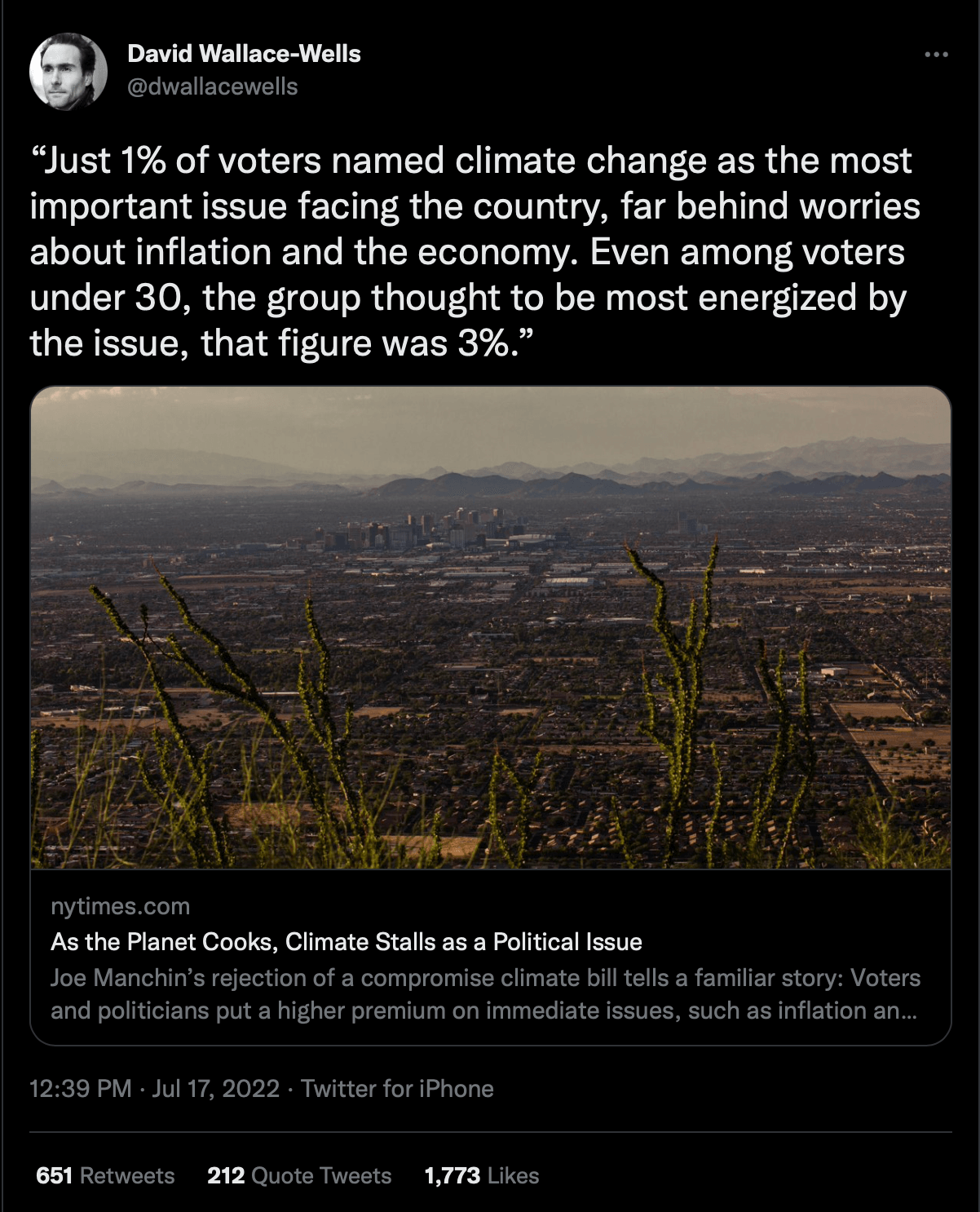Does Everyone Matter? Then Who Does?
If you think action on climate change is the most important issue facing the world today, you might be surprised to learn that you are still — despite 30+ years of warnings from climate scientists and at least two decades of increasingly apocalyptic rhetoric from climate activists, not to mention year after year of more intense and frequent heat waves, wildfires, power outages, storms and droughts — quite lonely in your conclusion:
Of course, you can still think climate change is a very big problem, even if you don’t think it’s the biggest. So let’s try this another way: In Pew Research Center polling reported in May, just 42 percent of Americans saw climate change as “a very big problem,” with Democrats four times as likely as Republicans to hold that view. Other problems that bigger percentages of Americans labeled as “very big” or “moderately big” included inflation, health care costs, violent crime, gun violence, the federal budget deficit, the quality of public K-12 schools, and the conditions of roads, bridges and other infrastructure. If you’ve followed these kinds of polls from Pew and Gallup in the past, you’ll know that this kind of low urgency ranking by the American public for climate action has been quite consistent over the last decade.
Scientists and climate activists continue to profess mystification and anger about this lack of widespread public urgency about climate change, especially in the face of scientific study after study. Some underreported research published in June in PNAS might shed some light on the problem — on why scientific information about the need for action on climate change doesn’t seem to stick, especially with skeptics. Researchers conducted a four-wave panel experiment to estimate
How much a media report with accurate scientific information about climate change would increase US subjects’ factual accuracy about climate change and their support for government action to address climate change; and
How long that factual accuracy and support for action would last over time, particularly in the face of skeptical opinion content.
Not very long and not very well, it turns out. The research is paywalled, but here’s a summary of it from the Guardian.
Thomas Wood, one of the study’s authors, told the Guardian that repetition of scientific accurate information was a potential solution to the problem:
“It was striking to us how amenable the subjects in our study were to what they read about climate change in our study. But what they learned faded very quickly,” he said. “What we found suggests that people need to hear the same accurate messages about climate change again and again. If they only hear it once, it recedes very quickly.”
One problem with this suggestion, of course: Scientists operating under the current model of science communication have no control over whether anyone will encounter their findings at all, much less whether anyone will be repeatedly exposed to those findings. Science has largely outsourced its relationship with its audiences to journalism — a sector addicted to a one-and-done model of messaging.
Another problem with Wood’s suggestion: It misstates the challenge of research communications.
The challenge isn’t to convert everyone or even the majority of people.
The challenge is to activate enough people who matter to policy and social change.
The passage in the US Senate of the Inflation Control Act — the most important climate action legislation in history — illustrates this principle. The bill didn’t pass because Joe Manchin suddenly came to his senses on the Green New Deal. The bill passed because, as Matt Yglesias put it this morning:
What happened here is that on all the non-consensus points — restricting fossil fuel production, nuclear, carbon capture, etc. — the left viewpoint lost out. We’re making progress because Biden embraced moderate solutions and because Manchin believed in them.
The next time you are messaging as a public expert — messaging your research and the implications and solutions to be drawn from it — ask yourself: Which audience do I need? Everyone to move policy action? Or just the people who matter?
It’s almost always the latter. Your challenge, then, is knowing who they are the most effective rhetorical modes you can use to get into conversation with them.




